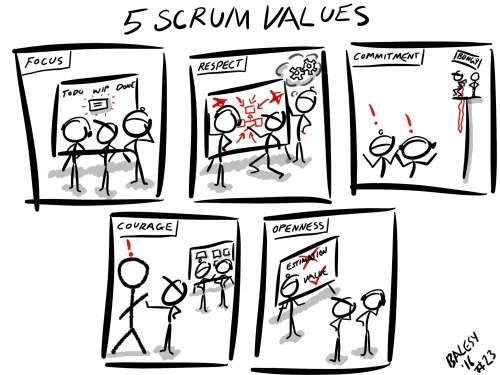5 Scrum Values
The 5 Scrum values of Focus, Respect, Commitment, Courage and Openness are a set of core values that Scrum depends upon to work successfully.
Practical Tips
| Focus | Encouraging the Scrum Team to Focus on the work, the Sprint Goal and to complete something that is really “Done” will help them to maximise their efforts to produce real tangible value.
It can be a migration in behaviour to change from being “comfortable but not really committed” by starting items and having them in a perpetual “work in progress” state, to actually completing them and delivering something of high quality value at the end of the Sprint. A Sprint tends to become real at this point where the only *real* value is the potentially releasable Increment, not the part done work. |
| Respect | A team that respects each other, their capabilities and their independent opinions will allow them to gain confidence and build trust, which then enables creativity in new ways of doing things, as well as honesty when working with dysfunctions or failure.
This resilience in a team to support and challenge each other can be a catalyst to optimum performance. Impartial facilitation can help to ensure that everyone has an equal voice within a safe environment that is conducive to building respect in the team. |
| Commitment | Personally committing to the Scrum Team and their goals places the team’s needs ahead of personal agendas and needs.
Teams that have already worked together for a while may see this as an intuitive understanding in the team, whereas newly formed teams may still need to progress through Tuckman’s stages of group development: forming, storming, norming in order to begin performing.[5] Drawing up an explicit agreement such as a team charter for example between the team members stating their individual commitments to the team and each other can help to set the tone of how they can work going forwards. |
| Courage | Doing the right thing may need some courage, even though it is the right thing to do.
Encouraging teams to stand together to face their challenges rather than avoid them, and resolve impediments rather than looking for the work around will help them to achieve their goals, as well as form a deep bond. |
| Openness | A team that is open and honest about the work and the way they work are more likely to inspect and adapt more readily than those that have a closed mindset.
Challenging the status quo and presenting data as a mirror to gently counter their mental models can help the team to become more aware of their actions, allow them to make conscious decisions and consider alternative perspectives. |
| Scrum Master Values | A new scrum master may also find it useful to challenge their own perceptions:
|
